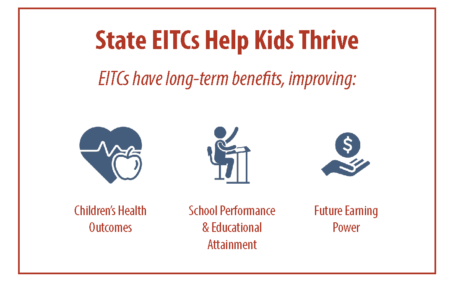The federal Earned Income Tax Credit (EITC) has long provided hardworking families the ability to achieve a better future and a pathway to the middle class. Though most families receive the EITC only temporarily, it has profound long-term benefits for families and communities. Children whose families receive the federal EITC are healthier, do better and go farther in school, and enjoy greater earnings as adults, establishing a more productive and skilled workforce for Missouri’s future.
Recent research has also identified a significant correlation between state EITCs and child welfare.
States that provide refundable State EITCs have had marked reductions in their rates of child maltreatment and reduced foster care entries compared to states without an EITC.
- A 2017 study found that abusive head trauma for children age 2 and younger was 13% lower in states with an EITC compared to states without one. Even very modest EITCs had a positive impact.
- A 2020 analysis found that state EITCs are associated with an 11% decrease in foster care entries. Based on these findings, a Missouri EITC could prevent foster care entry for as many as 796 children per year.
Investing in the prevention of child abuse and neglect has significant and lasting benefits for children, families, communities, and the state budget.
Children who experience abuse or neglect face a host of challenges including developmental delays, mental health and substance abuse challenges, low academic achievement, involvement with the criminal justice system, and diminished future productivity, all of which create a cost for the state.
In fact, research estimates the societal cost of treating these effects of child maltreatment at $830,928 over a child’s lifetime.
A Missouri EITC would provide a cost-effective tool for preventing abuse and would help keep families together. And, in cases where children must be removed from their biological families, a Missouri EITC can help eligible foster and adoptive families make ends meet and succeed.

A Missouri EITC Would:
✓ Help as many as 494,000 Missouri families from across the state pay for basic necessities like child care and car repairs,
✓ Benefit children’s health & education, and
✓ Support Missouri’s foster and adoptive families struggling to make ends meet.

